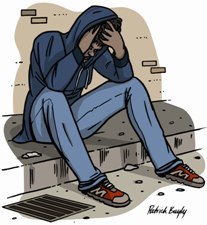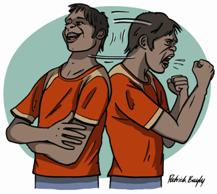Being dependent on drugs
What does it mean when someone is dependent on a drug?

Being hooked or dependent on drugs can vary from a mild urge to use to out-of-control use.
People who become dependent on a drug may become tolerant to that drug. This means they need to use more and more of the drug to get the same effect or to avoid withdrawal symptoms.
When people are dependent they believe they have to use the drug to do certain things or feel a certain way.
When someone is dependent their body has changed. If they suddenly stop taking the drug they may experience really unpleasant symptoms. Sometimes this can be life threatening. This is called withdrawal and can include feeling really sad or angry, or physical symptoms like vomiting, fits and cramps.

When someone is dependent on a drug they may begin to behave in unexpected ways – this can be very difficult for their family and community to manage.
Where to get help
Alcohol and Drug Support Service
Alcohol and Drug Support Line (formerly the Alcohol and Drug Information Service/ADIS)
24 hour 7 days a week, statewide counselling, information, referral and support to anyone concerned about their own or another person’s alcohol or drug use.
Phone: (08) 9442 5000 (metro callers) or 1800 198 024 (country callers)
Email: alcoholdrugsupport@mhc.wa.gov.au
Website: Mental Health Commission (external site)
Live chat: Visit Alcohol. Think Again. (external site) or Drug Aware (external site)
Parent and Family Drug Support Line (formerly the Parent Drug Information Service/PDIS)
24 hour 7 days a week, statewide counselling, information, referral and support for anyone concerned about a loved one’s alcohol or drug use.
Phone: (08) 9442 5050 (metro callers) or 1800 653 203 (country callers)
Email: alcoholdrugsupport@mhc.wa.gov.au
Website: Mental Health Commission (external site)
Live chat: Visit Alcohol. Think Again. (external site) or Drug Aware (external site)
Working Away Alcohol and Drug Support Line
24 hour 7 days a week, statewide counselling, information and referral to support the health and wellbeing of working away from home communities including FIFO/fly-in-fly-out workers, their families and friends.
Phone: 1800 721 997 (country callers)
Email: workingaway@mhc.wa.gov.au
Website: Mental Health Commission (external site)
Live chat: Visit Alcohol. Think Again. (external site) or Drug Aware (external site)
Meth Helpline
24 hour 7 days a week, statewide counselling, information, referral and support to anyone concerned about their own or another person’s methamphetamine use.
Phone: 1800 874 878
Email: alcoholdrugsupport@mhc.wa.gov.au
Website: Mental Health Commission (external site)
Live chat: Visit Alcohol. Think Again. (external site) or Drug Aware (external site)
Parent Drug Information Service (PDIS)
PDIS provide confidential telephone support, counselling, information, and referral services for parents.
This confidential service provides advice and support for family members 24 hours a day.
- Metropolitan callers: 9442 5050
- Country callers: 1800 653 203 (free from land line only)
Remember
- Drugs change your body and personality and can make you very sick.
- When someone is dependent on a drug they may begin to behave in unexpected ways.
- Your drug use affects your family, community and country.
Acknowledgements
Mental Health Commission
This publication is provided for education and information purposes only. It is not a substitute for professional medical care. Information about a therapy, service, product or treatment does not imply endorsement and is not intended to replace advice from your healthcare professional. Readers should note that over time currency and completeness of the information may change. All users should seek advice from a qualified healthcare professional for a diagnosis and answers to their medical questions.